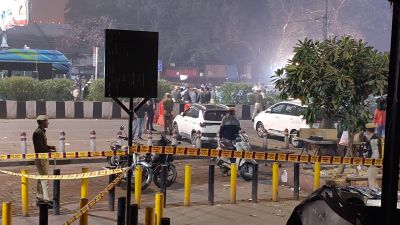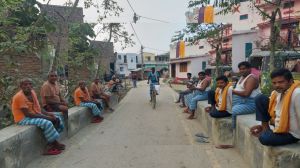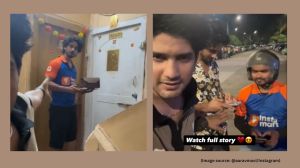Slice of life – Diwali draft
This is the puzzle Diwali places before us: the platter overflows, but the pulse feels hollow.
 “Diya jalaye rakhna,” our elders instruct—keep the lamp burning, as if flame itself could ferry affection across distances. (Credit: Suvir Saran)
“Diya jalaye rakhna,” our elders instruct—keep the lamp burning, as if flame itself could ferry affection across distances. (Credit: Suvir Saran)October leans against India’s shoulder like a half-forgotten song, carrying in her folds both fevered festivity and a faint film of fatigue. The nights are shorter, the air dustier, the markets mad with mithai—silver-clad kaju katlis stacked like miniature mirrors, motichoor laddoos glowing like harvest moons. Firecrackers crackle too early on terraces, as if children cannot wait for the calendar’s consent. And yet, between this abundance, a hush hovers—the hush of missing faces, the hush of half-spoken farewells, the hush of a heart rehearsing how to hold on when the very season asks it to let go.
We celebrate, yes, but celebration in India is never a solitary sport. It’s communal, cacophonous, compulsive. We light diyas not just to banish darkness but to remember we once had company in the corridors of night. Each flame flickers like a friend. Each phuljhari’s spark feels like a soul waving from another city, another century. “Diya jalaye rakhna,” our elders instruct—keep the lamp burning, as if flame itself could ferry affection across distances.
But October, cruel and kind, reminds us that lamps are not always enough. Some absences are not soothed by saffron syrup or silk saris. Some voids refuse to be veiled by velvet nights. We sit at Diwali tables heavy with food, heavy with fragrance, heavy with expectation—and still, one empty chair seems to weigh the most.
“Dil ki duniya ujadd gayi,” the ghazal sighs.
(Dil ki duniya ujadd gayi.)
The world of the heart has fallen to ruin.
And yet, paradox dances with us, uninvited: how can life be so rich and so poor at once? So drenched in light and yet so dry of love? This is the puzzle Diwali places before us: the platter overflows, but the pulse feels hollow.
I remember a Diwali years ago when someone I loved sat beside me stringing marigolds. The flowers fell between our fingers like gold coins dropped by a careless king. We laughed, we quarreled, we promised. This year, the marigold thread waits on my table, untouched. The memory works harder than my hands. Nostalgia can be more fragrant than fresh flowers; absence can be louder than firecrackers.
The Urdu poets knew this truth too well. Ghalib, Mir, Jigar—they lit their lines with longing more enduring than oil in a diya. They taught us that to love is to lose, and to lose is to learn how love lingers. Even unrequited, even unfinished, even undone, love refuses to leave. It waits at the window, wearing shadows as shawl, watching us as we spark rockets skyward.
“Kuch is tarah se teri yaad raat bhar aayi, diye jalte rahe, roshni kam pad gayi.”



- 01
- 02
- 03
- 04
- 05




























